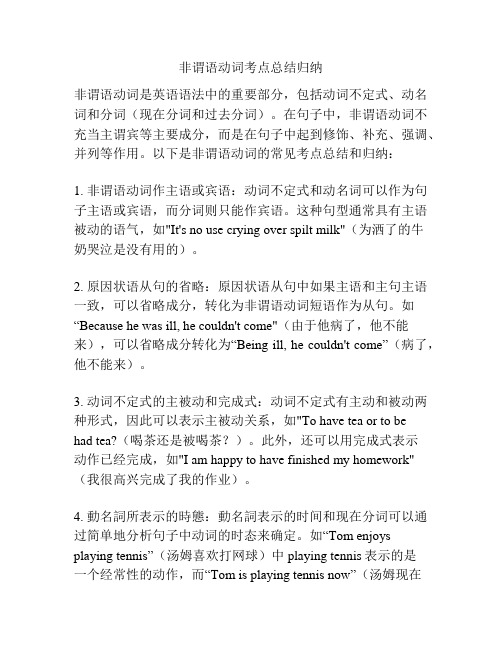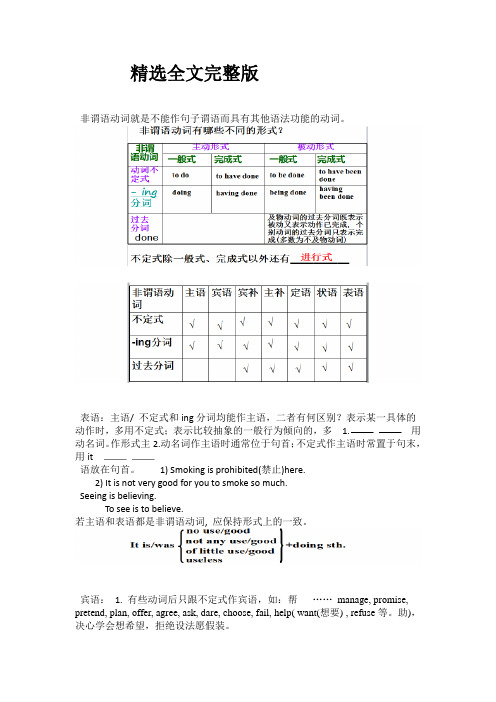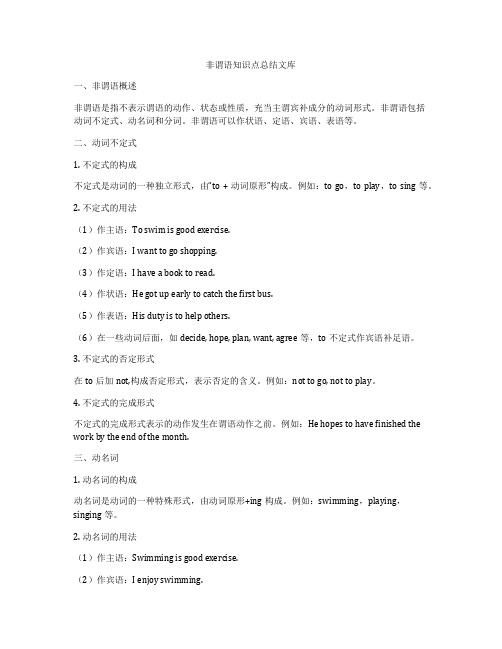常见的非谓语动词知识点总结
非谓语动词考点总结归纳

非谓语动词考点总结归纳非谓语动词是英语语法中的重要部分,包括动词不定式、动名词和分词(现在分词和过去分词)。
在句子中,非谓语动词不充当主谓宾等主要成分,而是在句子中起到修饰、补充、强调、并列等作用。
以下是非谓语动词的常见考点总结和归纳:1. 非谓语动词作主语或宾语:动词不定式和动名词可以作为句子主语或宾语,而分词则只能作宾语。
这种句型通常具有主语被动的语气,如"It's no use crying over spilt milk"(为洒了的牛奶哭泣是没有用的)。
2. 原因状语从句的省略:原因状语从句中如果主语和主句主语一致,可以省略成分,转化为非谓语动词短语作为从句。
如“Because he was ill, he couldn't come"(由于他病了,他不能来),可以省略成分转化为“Being ill, he couldn't come”(病了,他不能来)。
3. 动词不定式的主被动和完成式:动词不定式有主动和被动两种形式,因此可以表示主被动关系,如"To have tea or to behad tea?(喝茶还是被喝茶?)。
此外,还可以用完成式表示动作已经完成,如"I am happy to have finished my homework"(我很高兴完成了我的作业)。
4. 動名詞所表示的時態:動名詞表示的时间和现在分词可以通过简单地分析句子中动词的时态来确定。
如“Tom enjoys playing tennis”(汤姆喜欢打网球)中playing tennis表示的是一个经常性的动作,而“Tom is playing tennis now”(汤姆现在正在打网球)中playing tennis则表示现在正在进行的动作。
5. 分词作定语:现在分词和过去分词经常用作定语修饰名词,如shining stars(闪闪发亮的星星)、a book written by Hemmingway(海明威写的一本书)。
完整版非谓语动词知识点总结精选全文完整版

精选全文完整版非谓语动词就是不能作句子谓语而具有其他语法功能的动词。
表语:主语/ 不定式和ing分词均能作主语,二者有何区别?表示某一具体的动作时,多用不定式;表示比较抽象的一般行为倾向的,多 1.用动名词。
作形式主2.动名词作主语时通常位于句首;不定式作主语时常置于句末,用it语放在句首。
1) Smoking is prohibited(禁止)here.2) It is not very good for you to smoke so much.Seeing is believing.To see is to believe.若主语和表语都是非谓语动词, 应保持形式上的一致。
宾语:1. 有些动词后只跟不定式作宾语,如:帮……manage, promise, pretend, plan, offer, agree, ask, dare, choose, fail, help(want(想要) , refuse等。
助),决心学会想希望,拒绝设法愿假装。
主动答应选计划,同意请求帮一帮。
2. 有些动词后只跟动名词作宾语,如:practise, appreciate, dislike, excuse, forgive, keep, resist, risk, deny, advise,fancy, ……complete, forbid, permit, allow, stand, refer to, give up, lead to, take to, set about, getdown to, object to, succeed in, have difficulty in... 考虑建议盼原谅,承认推迟没得想。
避免错过继续练,否认完成就欣赏。
禁止想象才冒险,不禁介意准逃亡。
分后既可以跟不定式又可以跟ing3.有些动词如begin, start; love, like, hate, prefer 不定式表示具分词一般表示经常性的行为;词作宾语,意义上无多大区别(但ing。
非谓语动词知识点总结

非谓语动词知识点总结非谓语动词是英语语法中的一个重要知识点,它可以用来修饰主语或宾语,增强句子的表达力和信息量。
在本文中,我将详细介绍非谓语动词的用法和一些常见的形式。
希望通过本文的阅读,读者能够更好地理解和运用非谓语动词,提高自己的英语写作水平。
一、非谓语动词的定义和分类非谓语动词是指在句子中充当动词的成分,但不具备谓语的功能。
它不受主语的人称和数的限制,也不受时态的影响。
根据其形式和功能的不同,非谓语动词可以分为动名词、不定式和分词三种形式。
1. 动名词(Gerund)动名词是动词加上-ing形式构成的名词,常用作主语、宾语、表语、宾补等。
例如:- Smoking is harmful to health.(吸烟对健康有害)- I enjoy swimming in the sea.(我喜欢在海里游泳)- His hobby is playing basketball.(他的爱好是打篮球)2. 不定式(Infinitive)不定式是动词的原形加上to构成的形式,常用作动词、形容词或名词的补语。
例如:- He wants to buy a new car.(他想买一辆新车)- I have a lot of work to do.(我有很多工作要做)- The book is too heavy to carry.(这本书太重,无法携带)3. 分词(Participle)分词是动词的-ing形式(现在分词)或-ed、-en等形式(过去分词)构成的形容词,常用作定语、状语或补语。
例如:- The running water is very clear.(流动的水非常清澈)- The broken vase has been repaired.(打破的花瓶已经修好了)- We were surprised by the exciting news.(令人兴奋的消息让我们感到惊讶)二、非谓语动词的用法非谓语动词在句子中具有独立的语法功能,可以用来修饰名词、代词、动词、形容词和副词等,以及构成复合句的各种从句。
非谓语知识点总结文库

非谓语知识点总结文库一、非谓语概述非谓语是指不表示谓语的动作、状态或性质,充当主谓宾补成分的动词形式。
非谓语包括动词不定式、动名词和分词。
非谓语可以作状语、定语、宾语、表语等。
二、动词不定式1. 不定式的构成不定式是动词的一种独立形式,由“to + 动词原形”构成。
例如:to go,to play,to sing等。
2. 不定式的用法(1)作主语:To swim is good exercise.(2)作宾语:I want to go shopping.(3)作定语:I have a book to read.(4)作状语:He got up early to catch the first bus.(5)作表语:His duty is to help others.(6)在一些动词后面,如decide, hope, plan, want, agree等,to不定式作宾语补足语。
3. 不定式的否定形式在to后加not,构成否定形式,表示否定的含义。
例如:not to go, not to play。
4. 不定式的完成形式不定式的完成形式表示的动作发生在谓语动作之前。
例如:He hopes to have finished the work by the end of the month.三、动名词1. 动名词的构成动名词是动词的一种特殊形式,由动词原形+ing构成。
例如:swimming,playing,singing等。
2. 动名词的用法(1)作主语:Swimming is good exercise.(2)作宾语:I enjoy swimming.(3)作定语:I have a swimming pool.(4)作状语:She left after finishing her homework.3. 动名词的否定形式在动名词前加not来构成否定形式。
例如:not swimming, not playing。
非谓语动词知识点总结

非谓语动词知识点总结非谓语动词知识点总结非谓语动词,又叫非限定动词,非谓语动词是指在句子中不是谓语的动词,接下来是小编为您整理的非谓语动词知识点总结,希望对您有所帮助。
I.概述1.基本形式的变化:不定式:时态主动态被动态一般式to doto be done进行式to be doing完成式to have builtto have been builtJohn said that he had run in order to catch the bus. (一般式的主动态)He hated to be misunderstood by others. (一般式的被动态) He pretended to be listening attentively. (进行式)He intended to have told you that. (完成式主动态)This work of art seemed to have been created several centuries ago. (完成式的被动态)v-ing形式时态主动态被动态一般式doingbeing done完成式having donehaving been done注意:不及物动词没有被动式动名词I am sure of his coming in time. (一般式主动态) (= I am sure that he will come in time)He is proud of being selected as monitor. (一般式被动态) (= He is proud that he is selected as monitor.)I’m confident of his having passed the exam. (完成式主动态) (= I am confident that he have passed the exam.)He complained of having been cheated by others. (完成式被动态)现在分词He sat in a chair,reading a novel. (一般式主动态)Being exhausted by work, he fell asleep quickly. (一般式被动态)Having finished his homework, he went playing. (完成式主动态)All this having been settled, he went home. (完成式被动态)2.所做成分项目/成分主语表语宾语宾补定语状语动词的ing形式现在分词△ △△△动名词△△△ △不定式△△△△△△过去分词△ △△△注:现在分词、不定式、过去分词都可以作独立成分。
(完整版)非谓语动词考点总结归纳

Tom is sure of passing the exam. ( Tom 对自己通过考试很有把握 .)
考点三:非谓语动词作表语 不定式、动名词、分词做表语:
1. 不定式做表语常表示谓语动词所表示动作之后发生的动作。不定式一般紧跟在系动词如
: be, seem, remain,
appear 等后面 , 用来说明主语的内容。这类结构中的主语一般为名词,如:
We met many guests ,most of them Americans.( 补充说明 )
非谓语动词考点总结归纳
非谓语动词包括 不定式,动名词和分词 。它们是高中所学的基础语法,也是高考必考内容。既是高考的难点又是 高考的热点。真正领悟非谓语动词的用法要具备以下基础知识:
①具有句子结构的知识,会分析句子成分。 ②具有简单句最基本的五种句型的知识,要分得清双宾语和复合宾语。 ③具有扎实而丰富的动词知识,要分得清及物动词和不及物动词。 ④具备各种复合句的知o melt.
2) 当 begin 和 start 用于进行时时 .
eg: He is beginning to study English.
3) 当 begin 和 start 后面跟着一些表示心理状态的词时 . eg: I began to believe his story.
2.分词 解题诀窍:找逻辑主语,辨逻辑关系,析动作先后
语法作用:
1)表示时间,相当于表示时间,相当于状语从句
when, while 。常用于连词 When, before, while, after,
since 等后面。也可以省略连词
eg. When allowed, we are supposed to come into the room.
非谓语动词总结知识点
非谓语动词总结知识点一、动词不定式(Infinitive)动词不定式由“to + 动词原形”构成。
动词不定式在句子中可以作多种成分,具有名词的性质。
下面是动词不定式的主要用法:1. 作主语:To travel around the world is my dream.2. 作宾语:I want to study English.3. 作定语:The best way to learn English is to practice speaking.4. 作表语:My goal is to improve my English.5. 作状语:He goes to the library to study every day.当动词不定式作为宾语补足语时,它可以由动词原形构成(Bare Infinitive)。
例如:I saw him draw a picture yesterday. (我昨天看到他画了一幅画。
)二、动名词(Gerund)动名词是由动词的现在分词形式加上动词-ing构成的。
动名词在句子中可以作多种成分,具有名词的性质。
下面是动名词的主要用法:1. 作主语:Reading is my hobby.2. 作宾语:I enjoy swimming in the ocean.3. 作定语:I like watching movies.4. 作表语:His favorite activity is playing basketball.5. 作状语:He left without saying goodbye.动名词与不定式的区别在于,动名词具有名词的性质,而动词不定式具有动词的性质。
例如:I like swimming. (我喜欢游泳。
)I like to swim. (我喜欢游泳。
)动名词与动词不定式作宾语时,有时可以根据动词选择使用不定式还是动名词。
例如:I stopped smoking. (我戒烟了。
非谓语动词讲解史上最全
非谓语动词讲解史上最全非谓语动词是英语中的一种特殊动词形式,它们在句子中通常不具备时态和人称的变化。
非谓语动词包括不定式、动名词和现在分词。
一、不定式(Infinitive)不定式由to加动词原形构成,具有动词和名词的双重特征。
不定式在句子中可以作主语、宾语、表语、定语、状语等成分。
1. 作主语:To learn a foreign language is beneficial to your career.学习一门外语对你的事业有益。
2. 作宾语:I want to visit my grandparents this weekend.我想这周末去看望我的祖父母。
3. 作表语:His dream is to become a famous writer.他的梦想是成为一名著名的作家。
4. 作定语:She has many books to read.她有很多书要读。
5. 作状语:He came to help us.他来帮助我们。
二、动名词(Gerund)动名词由动词原形加-ing构成,具有动词和名词的双重特征。
动名词在句子中可以充当主语、宾语、表语、定语、状语等成分。
1. 作主语:Swimming is my favorite sport.游泳是我最喜欢的运动。
2. 作宾语:I enjoy reading novels in my free time.我喜欢在空闲时间读小说。
3. 作表语:Her hobby is singing.她的爱好是唱歌。
4. 作定语:The running water is clear.流动的水很清澈。
5. 作状语:She went shopping after finishing her homework.她在完成作业后去购物。
三、现在分词(Present Participle)现在分词由动词原形加-ing构成,具有动词和形容词的双重特征。
现在分词在句子中可以充当定语、表语、状语等成分。
(完整版)非谓语动词归纳总结
(完整版)非谓语动词归纳总结非谓语动词归纳总结非谓语动词是英语中一类特殊的动词形式,不具备人称和数的变化,也不充当句子的谓语。
非谓语动词包括不定式、动名词和分词,它们有各自的用法和功能。
1. 不定式不定式是非谓语动词的一种形式,结构为"to + 动词原形"。
不定式可以用作动词、形容词或副词。
1.1 动词不定式动词不定式可以充当句子的主语、宾语、宾语补足语等。
例如:- To study is important for students.(作主语)- I want to learn English.(作宾语)- She asked me to help her.(作宾语补足语)1.2 形容词不定式形容词不定式用于修饰名词或代词。
例如:- I have a book to read.(修饰名词)- He is the man to trust.(修饰代词)1.3 副词不定式副词不定式用于修饰动词、形容词或副词。
例如:- She worked hard to pass the exam.(修饰动词)- He is happy to see you.(修饰形容词)- She walked quickly to catch the bus.(修饰副词)2. 动名词动名词是非谓语动词的一种形式,结构为动词的现在分词形式。
动名词可以充当句子的主语、宾语、宾语补足语等。
例如:- Swimming is good exercise.(作主语)- I enjoy playing basketball.(作宾语)- She kept on talking.(作宾语补足语)3. 分词分词是非谓语动词的一种形式,根据时态和完成程度的不同,分词分为现在分词和过去分词。
3.1 现在分词现在分词用于表示主动或进行的动作。
例如:- The running boy is my brother.(作定语)- She stood there, crying.(作状语)3.2 过去分词过去分词用于表示被动或完成的动作。
非谓语动词考点总结归纳
非谓语动词考点总结归纳非谓语动词是英语中的一种重要语法形式,一般指动词的非时态形式。
常见的非谓语动词包括动词不定式(to + 动词原形)、动名词(-ing 形式)和分词(过去分词和现在分词)。
这些形式常常用来作定语、状语或宾语等成分,能够丰富语言表达,增强文学效果,因此在英语学习和考试中尤为重要。
下面我们就来归纳总结一下非谓语动词的考点和应用。
1.动词不定式作主语:to + 动词原形例如:To know her is to love her.(了解她就爱上她。
)To err is human. (犯错误是人之常情。
)To succeed, we must work harder.(要成功,我们必须更加努力。
)动词不定式作主语时,有时需要加上it作形式主语,而to + 动词原形作真正的主语。
It’s important to keep a balanced diet.(保持平衡饮食很重要。
)I want to go to the cinema tonight.(我今晚想去看电影。
)She decided to study abroad.(她决定出国留学。
)I asked him to help me with my homework.(我让他帮我做作业。
)动词不定式作宾语时,常常由动词后面的名词、代词、形容词等构成宾语补足语,表示宾语的具体内容或目的。
We need someone to help us with the project.(我们需要个人协助我们完成这个项目。
)动词不定式作定语时,表示被修饰名词的用途或目的。
My plan to visit China next year has been postponed.(我明年计划去中国的计划已经被推迟了。
)动词不定式作状语时,表示动作的目的、原因、结果、条件、方式等。
Mary gets up early to jog in the park.(Mary早起在公园里慢跑。
- 1、下载文档前请自行甄别文档内容的完整性,平台不提供额外的编辑、内容补充、找答案等附加服务。
- 2、"仅部分预览"的文档,不可在线预览部分如存在完整性等问题,可反馈申请退款(可完整预览的文档不适用该条件!)。
- 3、如文档侵犯您的权益,请联系客服反馈,我们会尽快为您处理(人工客服工作时间:9:00-18:30)。
非谓语动词①一个句子常不能出现两个做谓语的动词②非谓语动词即在句中不做谓语,但却具有部分动词的性质(接宾语或表语)③分类时间意义不定式后时性表将来一次性动作也称动词动名词泛时性概念性v-ing形式现在分词也称动词现时性主动意义过去分词分词形式完成性被动意义一、动词不定式:(to)+do,具有名词、形容词、副词的特征。
否定式:not + (to) do ; 完成式to have done;进行式; to be doing;1, 不定式的句法功能:(1)作主语: 常用it作形式主语,真正的主语不定式置于句后¥常用句式有:①It+be+名词+to do; ②It takes sb. + some time +to do; ③It + be+ 形容词+ of sb.(人的品质) / for sb. + to do;It is very hard for us to finish the work in ten minutes. It means failure to lose your heart.It is careless of you to make such a silly mistake. It’s necessary for you to treasure the time.(2)作表语:Her job is to clean the hall. He appears to have caught a cold.(3)作宾语:如果不定式(宾语)后面有宾语补足语,则用it作形式宾语,真正的宾语(不定式)后置,放在宾语补足语后面Marx found it important to study the situation in Russia. We think it important to study hard.·动词不定式也可充当介词宾语,如:I have no choice but to stay here. He did nothing last Sunday but repair his bike.动词不定式前有时可与疑问词连用,如:He gave us some advice on how to learn English. He asked me what to do next.(4)作宾语补足语:He tells me to study hard. He asked me to sit down.(5)作定语:被修饰的名词前有序数词、形容词最高级或next, second, last, only等限定词时候,只能用不定式。
He is always the first to come and the last to go. What’s the next to do She is the only girl to take part in the party.I have a meeting to attend. He found a good house to live in. The child has nothing to worry about.(6)作状语:①表目的:He worked day and night to get the money. She sold her hair to buy the watch chain.》②表结果(往往是与预期愿望相反的结果、意料之外):常放在never, only后He arrived late only to find the train had gone.I visited him only to find him out. The prisoner breaks prison two times, only to be caught.③表原因:They were very sad to hear the news.2, 不定式的省略:If you don't want to do it, you don't need to. 3, 不定式的并列:He wished to study medicine and become a doctor.二、动名词: 为名词的一种。
1.形式: Ving;否定式;被动式:完成式:完成被动式;复合结构:物主代词(或名词所有格)+ 动名词2.动名词的句法功能:(1)作主语:Reading aloud is very helpful. Collecting stamps is interesting.}(2)作表语:In the ant city, the queen's job is laying eggs. (3)作宾语: They haven't finished building the dam.(4)作定语:He can't walk without a walking-stick. Is there a swimming pool in your school(5)作同位语:The cave, his hiding-place is secret. His habit, listening to the news on the radio remains unchanged.固定搭配:①It is + useless (nice, good,interesting, expensive, fun, a pity, a pleasure等adj.或n)+ doing sth.It is useless speaking. It is nice seeing you again.It is good Playing chess after supper.It is expensive running this car.②There is (no use, no good, difficulty, trouble, problem, fun, a pity, a pleasure等adj.或n) + doing sth.There is no need to do…"There is great fun doing outdoor games. There is no pleasure seeing nature through dusty curtains.③Sb. have (difficulty, trouble, problem, fun, pleasure, no good, no need等名词) + doing sth.We have trouble working out the math problem. She has fun playing computer games.三、现在分词具有形容词和副词的特征。
现在分词的形式:否定式;主动语态;被动语态;1. 现在分词的句法功能:(1)作定语:The man speaking to the teacher is our monitor's father.(2)作表语: He is studying English now. (3)作宾语补足语:Can you hear her singing the song in the next room(4)作状语:①作时间状语:(While) Working in the factory, he was an advanced worker."②原因: Being a League member, he is always helping others. ③条件:(If) Playing all day, you will waste your valuable time.④伴随: He stayed at home, cleaning and washing. He gets home late, feeling tired and hungry.⑤结果: He dropped the glass, breaking it into pieces. The government failed to control the situation, causing the revolution of people.The construction of the gym caused much noise, making it difficult for people nearby to sleep.⑥目的: He went swimming the other day. ⑦让步:Though raining heavily, it cleared up very soon.四、过去分词的句法功能:1.作定语:Our class went on an organized trip last Monday. 2.作表语: The window is broken.、3.作宾语补足语:I heard the song sung several times last week.4.作状语Praised by the neighbors, he became the pride of his parents. Once seen, it can never be forgotten.Given more time, I'll be able to do it better. Though told of the danger, he still risked his life to save the boy.Filled with hopes and fears, he entered the cave. Encouraged by the success of his friend, he started seeking his fortune in city.非谓语动词注意的事项:1, 否定式都在其前面否定He apologized for his not bei ng able to arrive on time. I’m surprised at your not having noticed.:Not having finished his work, he could not leave the office. Jenny’s not having been trained as a dancer is her one regret.2, 主动形式表被动意义The city is worth visiting. The book is worth reading. I have a letter to post.但need/ require/ want/deserve 注意The flower needs to be watered. (√) The flower needs watering. (√) The flower needs to water. (×)The man deserves to be praised. (√) The man deserves praising. (√) The man deserves to praise. (×)Sitting on the bike, I came up with a lot of ideas. (√) Sitting on the bike, a lot of ideas came into my mind. (×)。
